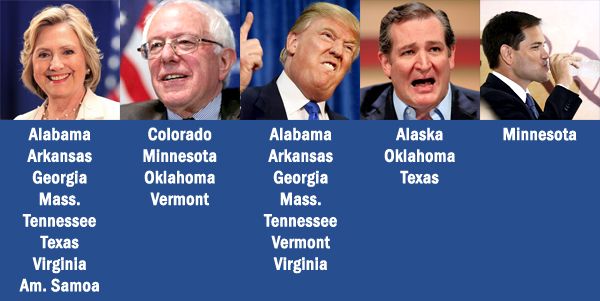
So, the results of Super Tuesday are in, and here's how it all shook out:
On the Democratic side, where the nominee needs 2,383 delegates, Hillary Clinton won seven states and one territory: Alabama, Arkansas, Georgia, Massachusetts, Tennessee, Texas, Virginia, and American Samoa, bringing her delegate total (sans superdelegates) to 544.
Bernie Sanders won four states: Colorado, Minnesota, Oklahoma, and Vermont, bringing his delegate total to 349.
On the Republican side, where the nominee needs 1,237 delegates, Donald Trump won seven states: Alabama, Arkansas, Georgia, Massachusetts, Tennessee, Vermont, and Virginia, bringing his delegate total to 285.
Ted Cruz won three states: Alaska, Oklahoma, and Texas, bringing his delegate total to 161.
Marco Rubio won one state: Minnesota, bringing his delegate total to 87.
John Kasich and Ben Carson, neither of whom have won any primary contest, have 25 and 8 delegates, respectively.
* * *
I did a little bit of tweeting last night as the returns came in and the candidates gave their speeches. I've Storified those tweets, for anyone who's interested.
A couple pieces of related news:
Bernie Sanders has vowed to stay in the race all the way to the convention. His campaign manager Jeff Weaver said during a CNN interview yesterday: "We're going all the way to the convention. We'll see you in Philadelphia." On the one hand, this is not great news for Clinton, if she is indeed the eventual nominee, because it gives her no downtime before the general election. On the other hand, Sanders staying in the race means that the Democratic contest will continue to feature in the news cycle, which will (marginally, sob) keep the cable news from being All Trump All the Time.
I didn't like it in 2008 when people were trying to push Clinton out of the primary, so I will not replicate that by saying I think Sanders should get out of the primary. That said, I do have serious concerns about his team's strategy [content note: racism]:
Sanders' goal was to emerge from Super Tuesday with a viable comeback path. But it's unclear how he envisions proceeding from here. His team has sketched a strategy that involves running up margins in the predominantly white states that have responded better to his message. He's hoping to rattle off wins in the weeks ahead in friendlier territory — Nebraska, Kansas and Maine, which are next on the calendar.Emphasis mine.
That strategy pisses me off for a number of reasons, not least of which is that I want black voters to help choose the Democratic nominee. Not just because black voters have a right to vote and for their votes to matter, and because it's gross to not prioritize the value of votes from a population most likely to be disenfranchised, but also because I understand how privilege and marginalization work.
Black Democratic voters—specifically black women—who are voting in their own best interests are going to choose a candidate whose policies also benefit me (and anyone else more privileged than they are). However, the reverse is not necessarily true: White Democratic voters, by virtue of our privilege, don't need to (and thus often don't) take into consideration the needs of black citizens.
I am thus very hostile toward the argument that black voters shouldn't be key in helping select the Democratic nominee. Black lives matter and black votes matter.
* * *
Next, the Democrats head to Kansas, Louisiana, and Nebraska on March 5 and Maine on March 6.
The Republicans head to Kansas, Kentucky, Louisiana, and Maine on March 5 and Puerto Rico on March 6.




Shakesville is run as a safe space. First-time commenters: Please read Shakesville's Commenting Policy and Feminism 101 Section before commenting. We also do lots of in-thread moderation, so we ask that everyone read the entirety of any thread before commenting, to ensure compliance with any in-thread moderation. Thank you.
blog comments powered by Disqus